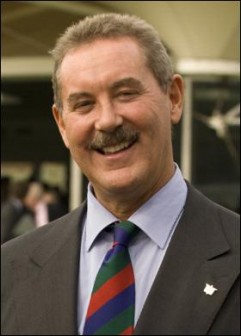HOUSTON, (Reuters) – Financier Allen Stanford was judged mentally fit to stand trial by a federal judge today, setting the stage for a trial next year in one of the biggest white-collar fraud cases since Bernard Madoff.
Stanford, 61, is accused of operating a $7 billion Ponzi scheme that bilked investors throughout the United States and Latin America.
He has been in federal custody since his arrest in June 2009 after being considered a flight risk.

U.S. District Judge David Hittner in Houston said a “preponderance of evidence” presented in a three-day hearing convinced him Stanford is capable of helping his attorneys prepare for trial.
Lawyers for Stanford argued unsuccessfully that their client suffers from a lasting brain injury from a jailhouse attack in September 2009, serious depression and said drugs administered after the brain injury have impaired his memory.
Prosecutors contended Stanford exaggerated his amnesia and they wanted his trial to start as scheduled in January.
Stanford looked back and waved at his mother, 81-year-old Sammie Stanford, as he was taken from the courtroom after the judge read his brief order.
Hittner said he would rule next week on a defense motion to delay the beginning of Stanford’s trial for four months.
Stanford, who once ran the Stanford Financial Group and owned luxury homes in the Caribbean, Houston and Miami, was indicted on charges of fraud, conspiracy and money laundering. He pleaded not guilty.
He is accused of running a Ponzi scheme involving the sale of fraudulent certificates of deposit issued by his offshore bank in Antigua. A Ponzi scheme is a fraud in which existing investors are paid with money from newer ones.
Hittner presided over three days of testimony on Stanford’s competency after Stanford was treated for more than eight months at a prison hospital in North Carolina, where he was weaned off anti-anxiety medication and underwent psychological testing.
“Mr. Stanford doesn’t want to fight,” Assistant U.S. Attorney Gregg Costa said in his closing statements yesterday. “He wants to con his way out this case just like he conned investors out of their money for 20 years.”
Doctors at the North Carolina facility found Stanford had “no mental illness which would interfere with his ability to understand the nature and consequences of the proceedings against him or to assist properly in his defense,” according to a report to Hittner.
“I see no brain injury that stands in the way of his standing trial,” Dr. Robert Cochrane, Stanford’s primary evaluator at the Butner federal prison hospital, testified.
Witnesses for Stanford, however, said doctors at the federal facility downplayed the severity of Stanford’s brain injury and mental problems.
They said he suffers post-traumatic stress disorder, major depression and insomnia, among other problems, that would make it hard for him to concentrate, analyze information or testify in his own behalf.
“The clinical diagnosis is very important to treatment decision as well as legal decisions such as in this court,” said Dr. David Axelrad, a forensic psychiatrist testifying for Stanford.
His attorneys said he would be unable to help them analyze a the massive amount of information related to his investment business.
“He can’t get on the witness stand,” Ali Fazel, a Stanford attorney, told the judge. “The fundamental right he has, he doesn’t have the ability to do.”
After the ruling, Stanford attorney Robert Scardino declined to comment on Hittner’s decision, citing a gag order.
“We will continue to get ready for trial,” Scardino said.
Stanford spent the night under psychological observation after a neuropsychologist testifying for the defense on Wednesday said Stanford had been suicidal at some period since his arrest.
Jail officials said in court they acted with “an abundance of caution” after the testimony on Wednesday.
Stanford’s mother, Sammie, denied her son is suicidal.
“That is laughable,” she told reporters after the hearing. “My son is not suicidal.”
Stanford was moved to a more secure room but not put under suicide watch, staff attorney Jennifer Hansen of the federal detention center in Houston, told the judge. She said she had requested that Stanford be under psychological observation again tonight.





